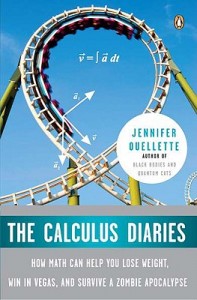So after flipping out this morning about my article falling apart, I rallied myself and attended a lecture by UW’s Science Writer in Residence Jennifer Ouellette. She specializes in physics as a freelancer and has written three books. Her lecture was called “Dangerous Curves: How I Learned to Stop Worrying and Love the Calculus” which was about the research that she did for her most recent book about math and how it can be applied in everyday life: “The Calculus Diaries: How Math Can Help You Lose Weight, Win in Vegas, and Survive a Zombie Apocalypse.”
I had hoped that her lecture would be about what it was like to write about a subject that she has no background in (the calculus) but it was actually more about why she thinks math is cool and people should appreciate it. It was still an interesting lecture, and I give her credit for drawing an audience that merged the interests of undergrad journalism majors and graduate math students. For the record, graduate math students seem to function on an entirely different plain, and I for one do not speak graduate level math.
 Ouellette did a great job of bringing in different clips and examples of how math is applicable in everyday life. She showed part of the television show Numbers (which isn’t on air anymore, but is an interesting example of how to use math for dramatic crime fighting) and the mathlete competition from the movie Mean Girls, where a less controversial Lindsay Lohan realizes that it is okay to like math.
Ouellette did a great job of bringing in different clips and examples of how math is applicable in everyday life. She showed part of the television show Numbers (which isn’t on air anymore, but is an interesting example of how to use math for dramatic crime fighting) and the mathlete competition from the movie Mean Girls, where a less controversial Lindsay Lohan realizes that it is okay to like math.
The zombie part of the title of her book has to do with a researcher who created an equation to figure out how best to survive a zombie apocalypse. Of course it is a multivariable calculus equation, which ultimately concludes that getting a gun and blowing away as many zombies as fast as you can is your best bet (although I think I could have concluded that without the calculus.)
The most interesting part of her talk for me (and the sorority girl in me does cringe to admit this) was when she starting talking about the game World of Warcraft. Apparently there was some sort of blood disease (similar to a highly contagious pandemic) that started spreading to the avatars in the game that was created by a player and started spreading rapidly through the program and the game actually had to be reset by its administrators to avoid all the characters dying of this plague-like disease. She brought it up as an example of how there can be technical models for real life situations, which actually didn’t have much to do with math, but is interesting from a science-health angle.
Overall, I’m not sure how useful her talk was in terms of helping me as a science writer, but it was entertaining, it got me out of the apartment, and I got away from my frustration over my article for a little while. I think I have my article situation figured out, sometimes just scrapping an idea and starting over from scratch is the best solution. I’m now feeling optimistic, so if only my eye would stop twitching things would be back to normal.
Ouellette’s blog Cocktail Party Physics is also a good example of science writing on the web, so be sure to check it out if physics is your thing.
